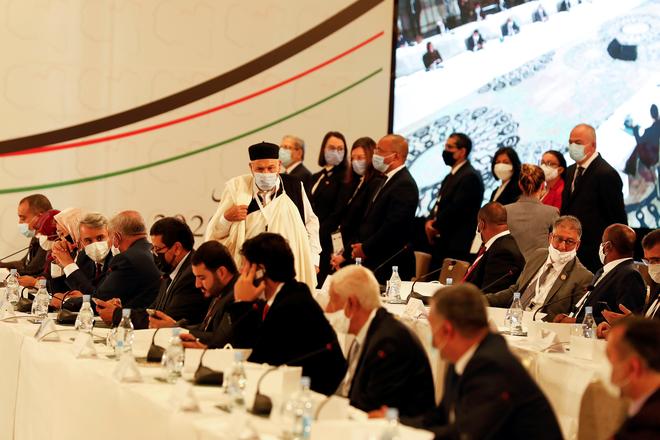The United Nations Mission in Libya concluded the Libyan political dialogue sessions in Tunisia without the Libyan parties reaching an agreement on the names of the candidates for the new authority and the mechanism for its formation.
The acting head of the UN mission - Stephanie Williams - stated that the Libyan dialogue round ended with positive results, and that a new round will be held next week remotely via video technology.
Williams confirmed that the participants in the Libyan Dialogue Forum agreed on the date of December 24, 2021, as a date for holding parliamentary and presidential elections on constitutional grounds, in addition to defining the terms of reference of the new executive authority and the conditions for candidacy for the Presidential Council and the government.
Sources in the Libyan Political Forum told Al-Jazeera Net that the members of the dialogue were surprised that Stephanie Williams ended meetings in Tunisia and announced future meetings via video technology.
Analysts and politicians stated that the failure of the United Nations Mission in Libya to announce clear items agreed upon after the end of the political dialogue sessions indicates the failure of the current round of ongoing consultations in Tunisia.
Disappointing results A member of the House of Representatives in Tobruk, Essam Al-Jehani, expressed his disappointment in the results of the Libyan dialogue in Tunisia because of what he described as a hidden agenda that the UN mission might prepare for in the coming days.
Al-Jahani said - to Al-Jazeera Net - that it is wrong for the UN mission to interfere in the terms of reference of the next authority and the mechanism of governance, in addition to the presence of people who place their hands in the hands of foreigners at the expense of the national interest to impose a certain fait accompli, as he put it.
He added, "I did not have confidence in the UN mission's assistance to the Libyans, because it had become a party to the political process, interfering in Libyan affairs, and pushing for a solution to impose it on the members of the Libyan Dialogue Forum."
The Libyan representative believes that transferring the dialogue sessions from the direct meeting to the meeting via video technology is not appropriate in meetings aimed at finding a final solution for a country that is witnessing conflicts, crises and division between its institutions.

Al-Rajhi stated - to Al-Jazeera Net - that a small group sees the solution in the person of Aqila Saleh (the current Speaker of Parliament) and is trying to install him as head of the new Presidential Council, considering that this group has caused the dialogue to fail.
He continued, saying, "The greatest responsibility for these choices is not on Stephanie Williams. Rather, these mistakes are borne by the staff of the UN mission, the remnants of Ghassan Salame, who are affected by suspicions of corrupt Emirati money and allowed them to choose the members of the Libyan dialogue."
Al-Rajhi believes that the UN mission's direction towards elections that represent the popular vision is better than empowering people in power who do not represent the Libyan people.
Al-Rajhi made it clear that the acting head of the UN mission, Stephanie Williams, must work in the coming weeks to form a solid constitutional base and a law for parliamentary and presidential elections, and not to reward power strugglers who confuse the scene, ignite wars from time to time, and obstruct any dialogue between Libyans.
Lost confidencePolitical analyst Abdullah Al-Kabeer attributed the reasons for the failure of the UN mission to complete the negotiation process in Tunisia to the lack of trust between the main Libyan parties, in addition to the intensity of competition, and the feverish desire of some personalities and their followers to obtain important positions in the formation of the new power.
Al-Kabeer told Al-Jazeera Net, "The UN mission sought to reconcile international and regional parties through their local allies to fabricate a new government with a vague promise to hold elections."
He emphasized that the crystallization of a movement within the dialogue led by national parties made a difference and pressure towards adopting the option of elections, which contributed to preventing the passage of any power-sharing deal without a real consensus that would be acceptable to most parties when it was put into effect.
The Libyan analyst stated that any additional dialogues will not lead to any change, but rather to more wasted time, as everyone will realize successively according to their mental and intellectual readiness that the current bodies and personalities no longer have anything to offer Libya except more crises.
Al-Kabeer believes that those in the Libyan political scene should leave and hand over power through new elections, or issue a referendum law on the draft constitution and set a date for that so that the people decide their fate and future.
